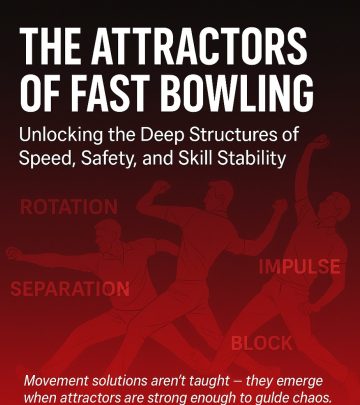Real Leadership: Building Confidence In Chaotic Times
Modern leadership builds self-growth and independence in high-pressure, real-world chaos!

Image: Instagram
Paddy Upton, widely recognized as The Barefoot Coach, is challenging traditional ideas of leadership. In his latest post, he states, “There’s a reason the old model of leadership is fading. Telling people what to do doesn’t grow them. It creates dependence.” This clear message sets the stage for a deeper conversation on how guiding individuals to make decisions in the midst of chaos builds more resilient, high-performing teams.
Fading Traditional Leadership
The old leadership model—where leaders are expected to dictate every move—has long been the norm across many high-stakes environments, including sports and business. However, as Upton emphasizes, such approaches can quickly create a ceiling for growth. By fostering dependency, leaders inadvertently limit the ability of team members to evolve. In the dynamic world of high performance, where pressure and rapid decision-making are everyday occurrences, this model simply doesn’t cut it.
Upton’s experience spans across the fields of cricket, elite sports, and business mentoring. His background, noted on various sources including reliable encyclopedic references, reinforces his observations: real leadership is less about issuing orders and more about nurturing the internal decision-making skills of individuals. This approach, particularly crucial during stressful moments, transforms raw potential into consistent competence.
The Rise Of Real Leadership
In his Instagram post, Upton further explains that real leadership means helping someone learn to decide for themselves—not in theory, but in the unyielding pressure of real-world scenarios. The imagery accompanying his post, depicting him in a candid moment engaged in conversation, visually supports his message of approachable, adaptive leadership. Instead of being the all-knowing expert, effective leaders guide their teams to operate autonomously, even under duress.
By urging his followers to comment ‘Real Leader’ to receive his in-depth article, Upton reinforces the idea that leadership is a skill that is cultivated over time. This approach is not about temporary fixes or quick results; it’s about building a foundation that endures. His perspective resonates widely, especially in environments where every decision can have significant consequences.
Bridging Theory And Practice
Upton’s method involves more than theoretical advice; it is rooted in practical experiences from high-performance sports. He often draws parallels between athletic performance and business leadership. For instance, in one of his earlier posts, he emphasized the importance of managing emotions carefully, noting that high performers create a necessary pause between feeling and reacting. This idea is crucial in leadership because the ability to manage personal emotion directly influences the capacity to lead others effectively.
The message Upton conveys is clear: leadership is not a static trait but an evolving process. True leaders help their teams develop internal confidence, which in turn leads to autonomous thinking and performance. When a leader steps back and allows others to navigate the chaos and pressure of real-time challenges, they create an environment ripe for growth. This model not only builds competence within the team but also ensures that team members are better equipped to handle unexpected situations independently.
Real-world Applications And Impact
The impact of this leadership shift is evident in various high-pressure arenas. In elite sports, for instance, teams that embrace autonomous decision-making often display higher levels of resilience and adaptability. Upton’s insights reflect a broader trend that many modern organizations are beginning to adopt. His commentary is particularly relevant in contexts such as cricket, where high-pressure scenarios demand that players and team members think quickly without relying solely on instructions.
Drawing from his extensive experience, Upton has become a trusted voice in mentoring athletes and professionals alike. His work encourages leaders to move beyond mere authority and focus on creating lasting competence. By building an atmosphere where individuals are taught how to extract their best performance under stress, leaders lay the groundwork for sustainable success.
A Call For Authentic Growth
The takeaway here is that authentic leadership goes beyond delivering commands—it involves a commitment to developing others. Upton’s approach reflects a significant departure from ego-driven leadership models. Leaders who focus on self-growth, both in themselves and in their teams, lay the foundation for success that extends far beyond short-term wins. His call to action, inviting followers to comment ‘Real Leader’ to delve deeper into the subject, underscores his belief that real growth happens when leaders inspire self-reliance and critical thinking.
Ultimately, this evolving leadership style drives home a simple point: growth sticks when individuals are empowered to find their own solutions in the midst of chaos. By moving away from the old expert model and embracing a more supportive, developmental approach, leaders can foster environments that lead to sustained excellence. Whether in sports, business, or any performance-driven field, the move towards genuine, nurturing leadership is not just timely—it’s essential.
Upton’s insights remind us that leadership is less about authority and more about empowerment. The shift he discusses is a testament to the changing dynamics of high-performance teams, and it invites current and aspiring leaders to reconsider how they guide and inspire. Real leadership, as defined by Upton, is about building teams that are capable, self-reliant, and ready to thrive under pressure. The foundation of any high-performance group is not the near constant supervision of an expert, but the shared confidence and competence that come from being trusted to lead oneself.
For those interested in understanding this modern take on leadership fully, Upton’s detailed analysis in his article, The Best Leaders Teach You to Lead Yourself, offers a deep dive into the subject. It’s a compelling reminder that the most effective way to lead is by empowering others to take the helm in their own development.
Read full bio of Joyce
























